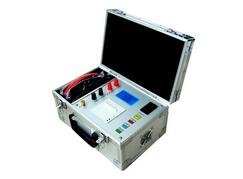The transformer DC resistance tester emits a continuous and uniform "click" sound during normal operation. If the generated sound is not uniform or there are other special sounds, it should be considered that the transformer is not operating properly, and the fault can be found out according to the sound and processed in time. There are mainly the following breakdowns: 
Overvoltage occurred in the power grid. When a single-phase ground or electromagnetic resonance occurs in the power grid, the transformer sound is sharper than usual. When this happens, a comprehensive judgment can be made in conjunction with the instructions of the voltmeter.
Transformer overload operation. The load changes greatly, and because of the harmonic effect, the “DCA†sound or “grilling†intermittent sound occurs instantaneously in the DC resistance tester of the transformer. The pointer of the monitoring and measuring instrument swings, and the pitch is high and the volume is large.
Loose clamps or screws. The sound is louder than usual and there is noticeable noise. However, if there is no obvious abnormality in the current and voltage, the internal clips or the screws that press the iron core may loosen, causing the vibration of the silicon steel sheet to increase.
Partial discharge of the transformer. If the transformer's drop-out fuse or tap-changer is in poor contact, there is a “beep†sound; if the transformer's transformer casing is dirty, the surface enamel falls off or there is a crack, and a “click†sound can be heard. If the internal partial discharge of the transformer or the electrical connection is poor, it will give out a "beep" or "click" sound, and this sound will change with the distance from the fault. At this time, the transformer should immediately be deactivated.
Short circuit in transformer winding. The sound of water boiling in the sound, and the rapid temperature change, the oil level rises, it should be judged as a short circuit fault winding transformer, in severe cases, there will be a huge roar, and then may be a fire. At this time, the transformer should be immediately disabled for inspection.
The transformer shell flashes and discharges. This sound occurs when the transformer winding high voltage causes the outlets to discharge from each other or when they are out of the enclosure flashover. At this time, the transformer should be deactivated.
Odor, color anomaly
Explosion-proof tube explosion-proof membrane rupture: burst of explosion-proof tube explosion-proof membrane will cause water and moisture to enter the transformer, resulting in the emulsification of insulating oil and transformer insulation strength.
Casing flashover discharge, casing flashover discharge will cause heat to cause aging, damage to the insulation and even an explosion.
Lead wires (wiring heads) and line cards are overheated and cause abnormalities. Casing terminal parts are loosened or lead wires are not slippery. Contact surface is oxidized so that the contact is overheated, the color becomes dark and luster, and the surface plating is also Destroyed.
Sleeve fouling causes an abnormality; casing fouling produces corona, flashover will occur ozone odor, cooling fan, burning of the oil pump will emit a burning odor.
In addition, excessive moisture absorption, gasket damage, too much water into the oil chamber and other reasons will cause moisture discoloration.
Abnormal oil temperature
It was found that under normal conditions, if the oil temperature is more than 10 degrees Celsius higher than usual or the load is constant and the temperature keeps rising (in the case where the cooling device is operating normally), it can be judged that there is an abnormality inside the transformer. Mainly for:
Internal fault caused temperature abnormality. Its internal faults, such as windings or inter-layer short circuits, coil discharge to the enclosure, internal lead joint heating, iron core multi-point grounding to increase eddy current overheating, zero-sequence unbalanced current and other leakage flux through the formation of a loop with the iron tank heating Such factors as abnormal transformer temperature. When these conditions occur, gas or differential protection actions are also accompanied. When the fault is serious, it is also possible to inject the explosion-proof pipe or pressure relief valve. At this time, the transformer should be deactivated and repaired immediately.
Abnormal temperature caused by abnormal cooler operation. The cooler is not operating properly or has failed. For example, the submersible pump is out of operation, the fan is damaged, the radiator pipe is fouled, the cooling effect is not good, the radiator valve is not open, the thermometer indicates a failure, etc. Perform maintenance and flushing to improve its cooling effect.
Transformer DC Resistance Tester Oil Level Abnormal
Abnormal oil level and oil leakage during the operation of the transformer are common, and inspections and inspections should be carried out from time to time. The main performances are the following two aspects.
1, false oil level: oil standard tube plugging; oil pillow sucker plug; explosion-proof pipe plugging.
2. Low oil level: The transformer is seriously leaking oil. Workers are unable to replenish the oil due to work needs. The temperature is too low and the oil volume is insufficient, or the capacity of the pillow is too small to meet the operational needs.

800W hand -held immersion blender,electric hand blender ,hand blender turbo,Variable Speed Hand Blender
NINGBO CHENGTUO ELECTRIC APPLIANCE CO.,LTD , https://www.chengtuoappliance.com
![<?echo $_SERVER['SERVER_NAME'];?>](/template/twentyseventeen/skin/images/header.jpg)